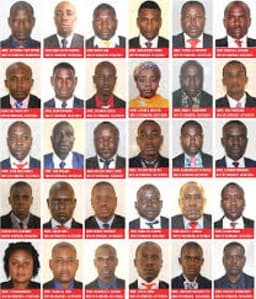
ASUU STRIKE SIGN
Academic activities were grounded in some universities during the week following the ongoing strike by the Academic Staff Union of Universities.
The development has left thousands of students preparing for their examinations stranded, while local businesses are experiencing low patronage.
ASUU began a two-week warning strike on Monday to protest the Federal Government’s failure to sign the renegotiated agreement reached by the Federal Government Tertiary Institutions Expanded Negotiation Committee led by a former Secretary to the Government of the Federation, Yayale Ahmed, which concluded its sittings over eight months ago.
ASUU Chairman, University of Ibadan chapter, Dr Adefemi Afolabi, had said the union was forced into the warning strike due to what he described as government’s “delay tactics” and disregard for the principles of collective bargaining.
He said the union waited patiently for eight months and even organised protests to sensitise Nigerians on the need for the government to sign the renegotiated agreement.
However, the government only came back with a new committee to restart the entire process.
“This is a waste of time and resources, an indication that the government is only interested in wasting our time and is not ready to resolve the welfare and conditions of service of lecturers,” Afolabi said.
Findings by Sunday PUNCH showed that due to the strike, many university campuses across the country have become deserted as lecturers boycott classes.
Some local business owners around the universities also lamented that the strike had dealt a major blow to their livelihoods.
Those most affected include the food vendors, commercial motorcyclists, hostel operators, and stationery sellers, among others.
University of Ibadan deserted
At UI in Ibadan, a food vendor, who sells near the Students’ Union Building, Tunde Ajayi, said patronage had dropped since the strike began.
He noted, “Once ASUU began the strike, students stopped coming around. Yesterday, I sold less than half of what I usually sell. We are just praying it doesn’t last long.”
Another trader, Bose Ogunleye, who runs a convenience store in the Agbowo area of the Oyo State capital, also described the situation as “a big blow.”
She said, “Even though some people are still around, sales have gone down badly. The campus is already emptying. Most shop owners have locked up and travelled.”
Our correspondent, who visited the campus on Thursday, observed that many lecture halls were deserted as the once-bustling environment had turned unusually quiet.
Many students were seen leaving hostels with their luggage, while several shops and stalls around the institution were shut or operating half-heartedly.
A 300-level education student at the university simply identified as Opeyemi expressed disappointment over the strike, saying it had disrupted their academic calendar once again.
She lamented, “We just resumed after the last break, and now another strike. It’s frustrating because we don’t know how long this will last. Most of us have started going home already.”
Similarly, a final-year student in the Faculty of Arts, Aminat, said she feared the industrial action might delay her graduation.
She stated, “I was supposed to start my final exams in two weeks. This strike means everything is on hold. It’s emotionally draining.”
Exams disrupted at IMSU
The same scenario played out at the Imo State University as very few students and lecturers were seen on the campus.
From kiosk owners, operators of business centres, photocopy and typing shops, food kiosks, bus drivers, car rental services for Uber, and recharge card sellers, it’s a business lull.
A kiosk owner in the school, Nkechi Okere, lamented that feeding had been difficult in her home.
According to her, due to the absence of the students, she has started eating into her savings.
Okere said, “Ideally, I make a little about N4,000 profit daily from the sale of soft drinks, buns, doughnuts, fried meat, biscuits, chewing gum, and sweets.
“However, due to the strike, the students and their lecturers are not in school. It’s just the security operatives and probably management staff.”
A shuttle bus driver at the school, Kingsley Nnamdi, said he had changed routes to be able to feed because of the absence of students from the institution.
Nnamdi stated, “There are some comfortable students who don’t have a car but have an arrangement with me to pick them up from their homes and bring them to school. I have done it for years and factored that money into running my family.”
For Philip, who runs a business centre, the strike means a loss of business and no savings.
Philip said, “There are no lecturers to give students assignments that must be typed. I’m not typing or printing any document. I’m not seeing anybody, including my friends; not even the ad hoc staff who work for me for some stipends.”
A food vendor, Amaka Andrew, said she had stopped cooking because students or lecturers were not around to buy.
Findings showed that the school was conducting examinations before the strike, as the students could not sit exams for GNS courses as a result of the development.
It was gathered that the non-academic staff had agreed to supervise the exams, but ASUU national secretariat warned that such an exercise was a nullity.
A lecturer, who pleaded anonymity, said ASUU members were avoiding entering the school premises to avoid falling foul of the directive from the union because the monitoring team were ubiquitous as they stayed in hiding to report to their authorities.
He said, “Ideally, I get to see about 40 students daily, those submitting assignments, and seeking some sort of support, but I’m shocked that in a whole week, I have not attended to 20 students. They are totally outside the school because they know that we can’t be seen to be attending to them.”
Lafia, Uyo and Jos varsities grounded
During a visit by our correspondent to communities around the institution, including Mararaba and Akunza on Friday, it was observed that most shops and business places were closed due to the absence of lecturers and students.
A tricycle rider, Ibrahim Ademola, told Sunday PUNCH that since the ASUU strike commenced on Monday, he had not been able to meet up with the financial responsibilities of his family.
He urged the Federal Government and ASUU to work towards resolving their issues to restore academic activities to the university and other universities across the country.
Another business owner, who operates a cyber café around the university, Juliana Joshua lamented that low patronage had forced her to close her shop.
At the University of Uyo, Akwa Ibom State, business operators have expressed concern over the low patronage recorded in their business operations for two weeks after the strike was declared.
A woman, who operates a restaurant near the Town Campus gate of the university, Ekemini Akpan, lamented the effect of the strike on her business.
She said, “We have been experiencing low patronage since the strike started and we pray that the strike should not continue in the future.”
Also speaking, one of the business operators, who deals in stationery, Christian Udo, regretted opening his shop.
Also, a medical store attendant in the school, who spoke on condition of anonymity, said, “We relocated to this place about two years ago but each time there is a strike, it affects us badly in terms of patronage. So, we are calling on the Federal Government to do the needful in order for ASUU to call off the strike.”
Findings revealed that the ongoing two-week warning strike by the academic union was hitting hard on business operators at the University of Jos, Plateau State.
Sunday PUNCH, who visited the Bauchi Road location of the campus of the university on Friday, saw many shops within the campus closed while some were experiencing a decline in patronage, with owners sitting idly, waiting for customers.
Jude Izang, a man who operates a business centre opposite the campus, expressed frustration over the low patronage.
He said, “I can’t totally blame less patronage in our business on the ongoing two-week warning strike by ASUU because even before the strike started, the students have finished their second semester examinations for the undergraduate students and have closed for the session.”
Izang noted that the university’s closure had already affected business, with few students around, and the strike further exacerbated the situation.
He stated, “Many of them have left the campus before the strike. As soon as the school is not in session, you will only find a few students around, and that usually affects our business.”
He added that the absence of lecturers, who were regular visitors to the campus, had worsened the situation.
“Now, because of the strike, lecturers who used to come to school whether they are in session or not are no longer coming, adding to the difficulty we face,” Izang lamented. (Sunday PUNCH)



























NEWS EXPRESS is Nigeria’s leading online newspaper. Published by Africa’s international award-winning journalist, Mr. Isaac Umunna, NEWS EXPRESS is Nigeria’s first truly professional online daily newspaper. It is published from Lagos, Nigeria’s economic and media hub, and has a provision for occasional special print editions. Thanks to our vast network of sources and dedicated team of professional journalists and contributors spread across Nigeria and overseas, NEWS EXPRESS has become synonymous with newsbreaks and exclusive stories from around the world.